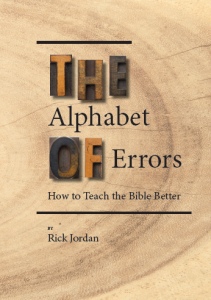It happens every Thursday…
Every Thursday, I release a new interview with a scholar, an author, or a practitioner. We talk about the Bible, interpretation of the Bible, or spiritual formation. I do this in the hope that those of us who are good Bible teachers will come closer to becoming great Bible teachers. Here is the list of interviews that have been published. Simply click on the arrow in the center of the photo to watch the video.
The Four Adult Learning Styles and How I Use Them – We may be tempted to follow the literature piece or to teach in only the way we like to learn. Find out about other learning styles that will reach more of your class members. Bo Prosser has been teaching and coaching congregational leaders for over 30 years. He has published seven books, over fifty articles, and contributed chapters to numerous titles on leadership, creativity, humor, and learning.
Live Like Your Father – James, the Bible’s problem child, an epistle of straw (according to Luther) – so what is there to like? Lots, according to Mariam Kovalishyn, associate professor of New Testament at Regent College in Vancouver, BC, who recently published a commentary on the book of James.
The Four C’s of Biblical Interpretation – We may be tempted to use only one way to interpret a Biblical text. Use at least one more to add depth to your lessons advises Dr. Barry Jones of Campbell University Divinity School, Buies Creek, NC. Insights from his book published by Smyth & Helwys, Gaining a Heart of Wisdom.
A Slow and Silent Reading of Scriptures – A pondering prayer in silence is one way to invite God’s spirit to inform and shape us. Here’s the technique one pastor uses to equip parishioners, sometimes called lectio divina or holy reading. Garrett is the co-pastor, with his wife, of Fort Street Presbyterian Church in Detroit.
There’s a Reason for the Repetition – The Bible was written with listeners in mind. Today’s readers gloss over texts that the early hearers of the Word would have recognized as significant. While we can still appreciate the construction and grasp some understanding when we read, we miss much of the message because we’re working in the wrong medium. Paul Borgman, recently retired English professor from Gordon College, equips readers to read as if hearing, focusing on overlapping patterns of hearing cues that shape each text and embed theological perspective.
Jesus, Race, and the Bible – Mitzi Smith recently co-authored the book, Toward Decentering the New Testament: A Reintroduction, as an alternative to traditional introductory texts. In this interview, Mitzi talks about that project, about how sexual abuse relates to Jesus’s crucifixion, and about the slave society of the early church. She is Professor of New Testament at Columbia Theological Seminary.
Biblical Contradictions as Conversation Starters – Why does one Biblical teaching seem to contradict another Biblical teaching? How does the Old Testament inform the New Testament? Are the Jews exclusively God’s chosen people? Dr. Frank Spina taught Old Testament at Seattle Pacific University for 46 years and is the author of The Faith of the Outsider: Exclusion and Inclusion in the Biblical Story.
The Basics of Biblical Interpretation – Robert Canoy shares the six steps he uses before preaching or teaching a Bible study lesson. Canoy is the Dean of the Gardner-Webb University Divinity School in Boiling Springs, NC.
Studying the Old Testament with Commentaries – The Old Testament is hard to understand at times. Commentaries can be great helps – but which commentaries should you use? Stephen Chapman is Associate Professor of Old Testament at the Duke University Divinity School and the author of 1 Samuel as Christian Scripture: A Theological Commentary.
Being Honest About Violence in the Bible – Violence in the Bible, particularly in the Old Testament, makes the Bible teacher squirm. What do we do with these passages? Stephen Chapman is Associate Professor of Old Testament at the Duke University Divinity School.
The Talking Book – As old as the Bible is, it speaks fresh words when we are open to hearing them. Bible study teachers have a responsibility to bring fresh, challenging words – and a responsibility to “do no harm” as we interpret the text. Allen Callahan is an independent scholar whose book, The Talking Book: African Americans and the Bible traces the development of Black culture from slavery’s secluded forest prayer meetings to the bright lights and bold style of today’s hip-hop artists.
Pay Attention to the Tensions – Paul was a great missionary, evangelist, theologian, and church planter. Still, he remains divisive. Todd Still, Dean of the Truett Divinity School, shares his enthusiasm for Paul in this interview.
Put the Spirit in Spiritual Formation – As Bible teachers, we are not alone. The Holy Spirit is present and working. One method of giving the Spirit space to work is by offering reflective silence and holy readings (lectio divina). Angela Reed is Associate Professor of Practical Theology and the Director of Spiritual Formation at Truett Seminary, Baylor University, Waco, Texas.
Africa in the Bible – Africa is a large continent, larger than we give credit to, according to Dr. Rodney Sadler. And that affects our understanding of the Bible. He also points out the fallacy of interpretations around the curses of Cain and Ham – interpretations that are still promoted today in some Christian circles. Dr. Sadler is Associate Professor of Bible and Director, Center for Social Justice and Reconciliation, at Union Presbyterian Seminary, Charlotte, NC
Questions, Contexts, and Commentaries – We teach best when there is the freedom to ask questions and the freedom to share personal perspectives. Scott Ryan of Claflin University talks about the power of questions and the importance of context – both of the ancient texts and of the modern interpreter.
Jesus was a Troublemaker – People in power want the endorsement of Jesus. People without power – those are the ones Jesus spoke to and for. If we want to know the real Jesus, we need to listen to Biblical interpretations from people who are not from the dominant culture but from those the dominant culture holds down. Listen to those who are, like the earliest Christians under Roman domination, the non-violent resistors. Dr. Blount is President and Professor of New Testament at Union Presbyterian Seminary in Richmond, VA
Reading as an Extension of Prayer – Marilyn McEntyre shares insights from her life, her teaching life (recently retired as an English professor), and from her writings. The author of 15 books and a frequent retreat/conference leader, she shares her wisdom about reading, poetry, and that even a to-do list has the potential to be an instrument for spiritual understanding.
Would Luke’s Jesus Support You? – On May 25, 2020, George Floyd was killed. Before we knew of his death, but earlier that same day, Lewis Brogdon spoke to me about the need for Christians to listen to minorities and to their insights into the Scripture. The Gospel of Luke demonstrates Jesus’s concern for the underprivileged and his condemnation of the privileged. We who are privileged have found ways to take the teeth out of Jesus’s teachings and life. Lewis Brogdon says we need to rediscover this revolutionary, Jesus.
Trends that Concern Me about Today’s Church – Brian McLaren talks with Rick Jordan about the persons who were the Great Bible Teachers that shaped his faith, the importance of searching out interpreters of Scripture who have a different background than ourselves, the four crises facing the Church, and the dangers of white supremacists using the Bible for justification of their evil behavior.

